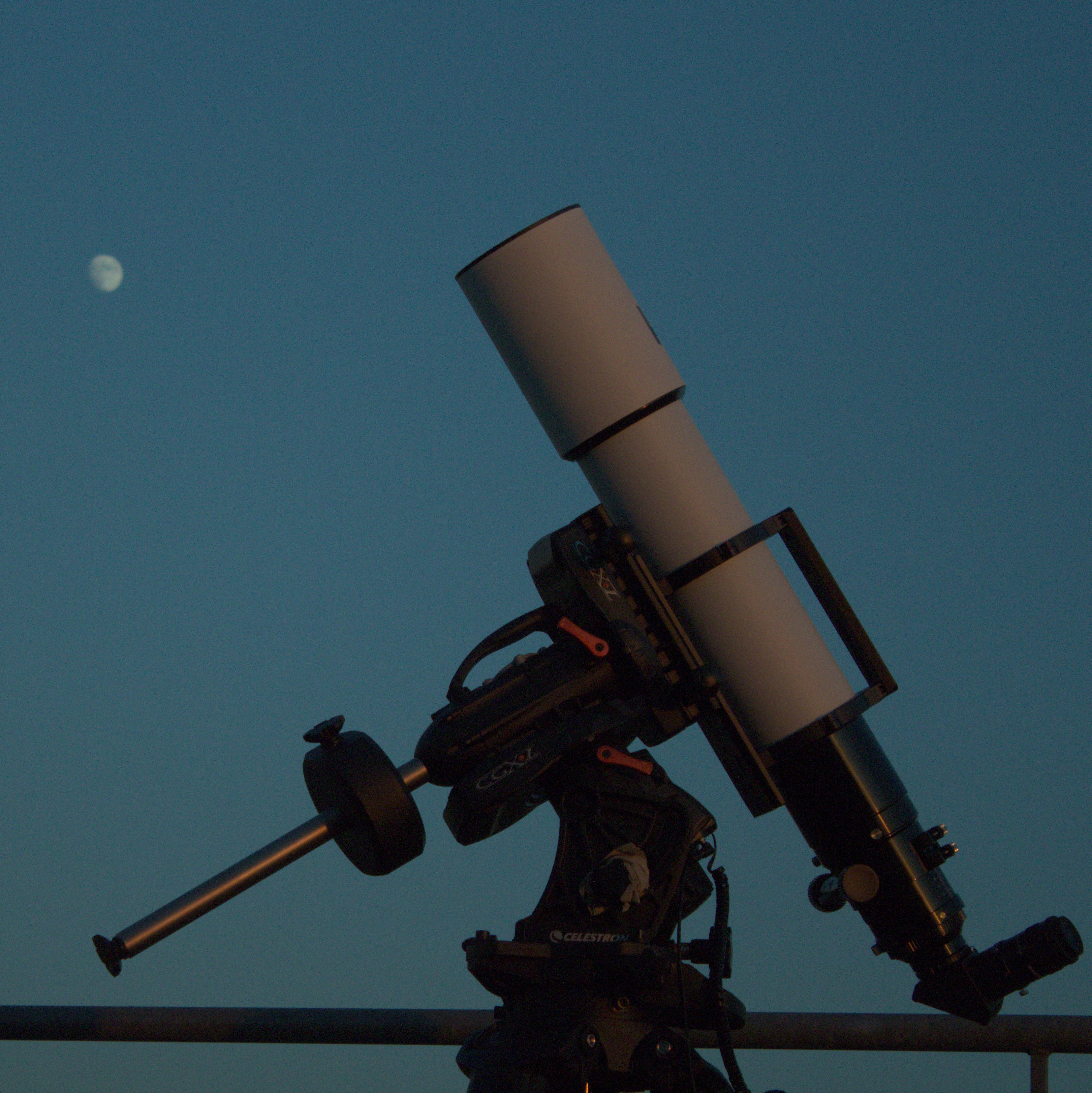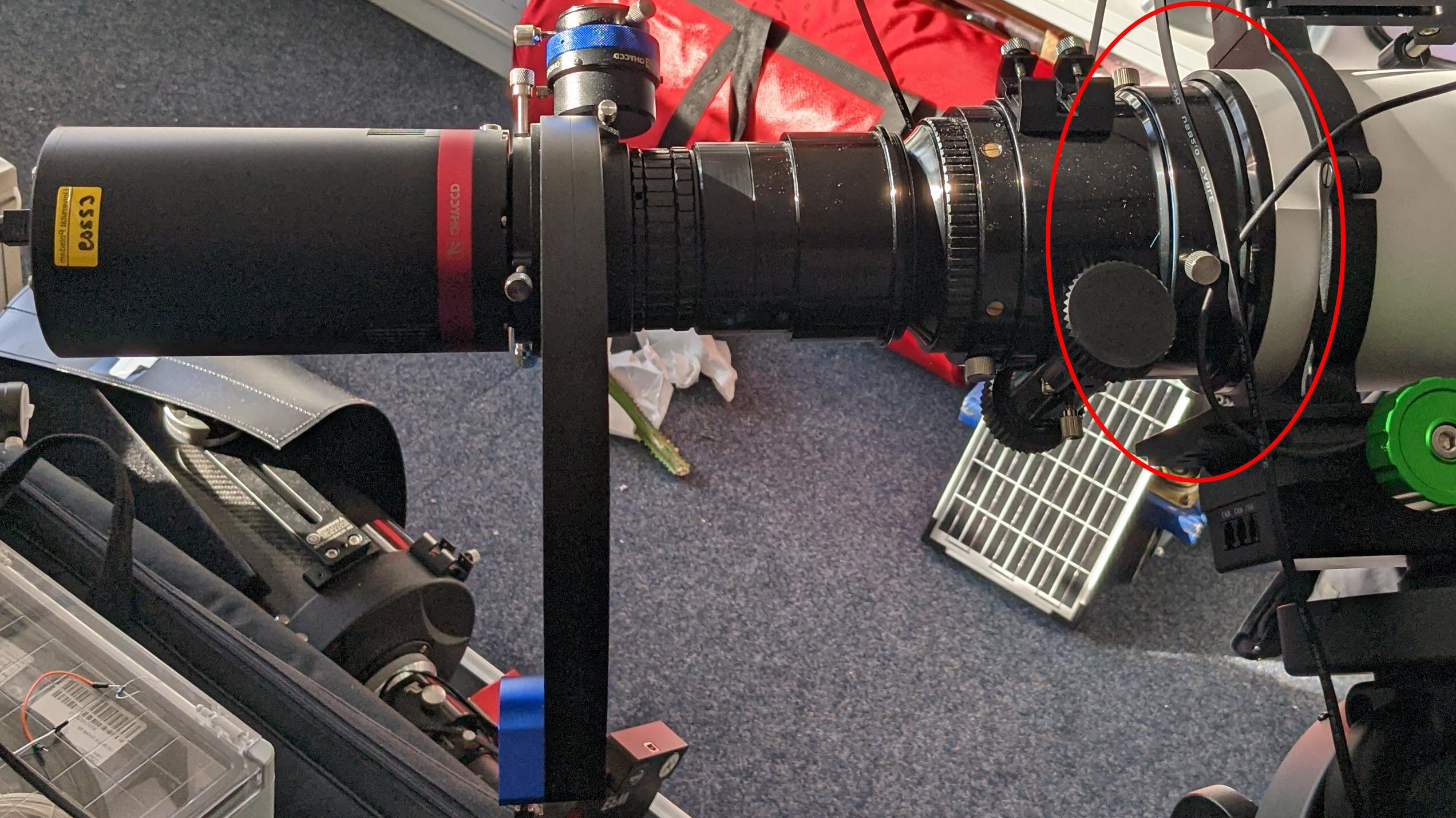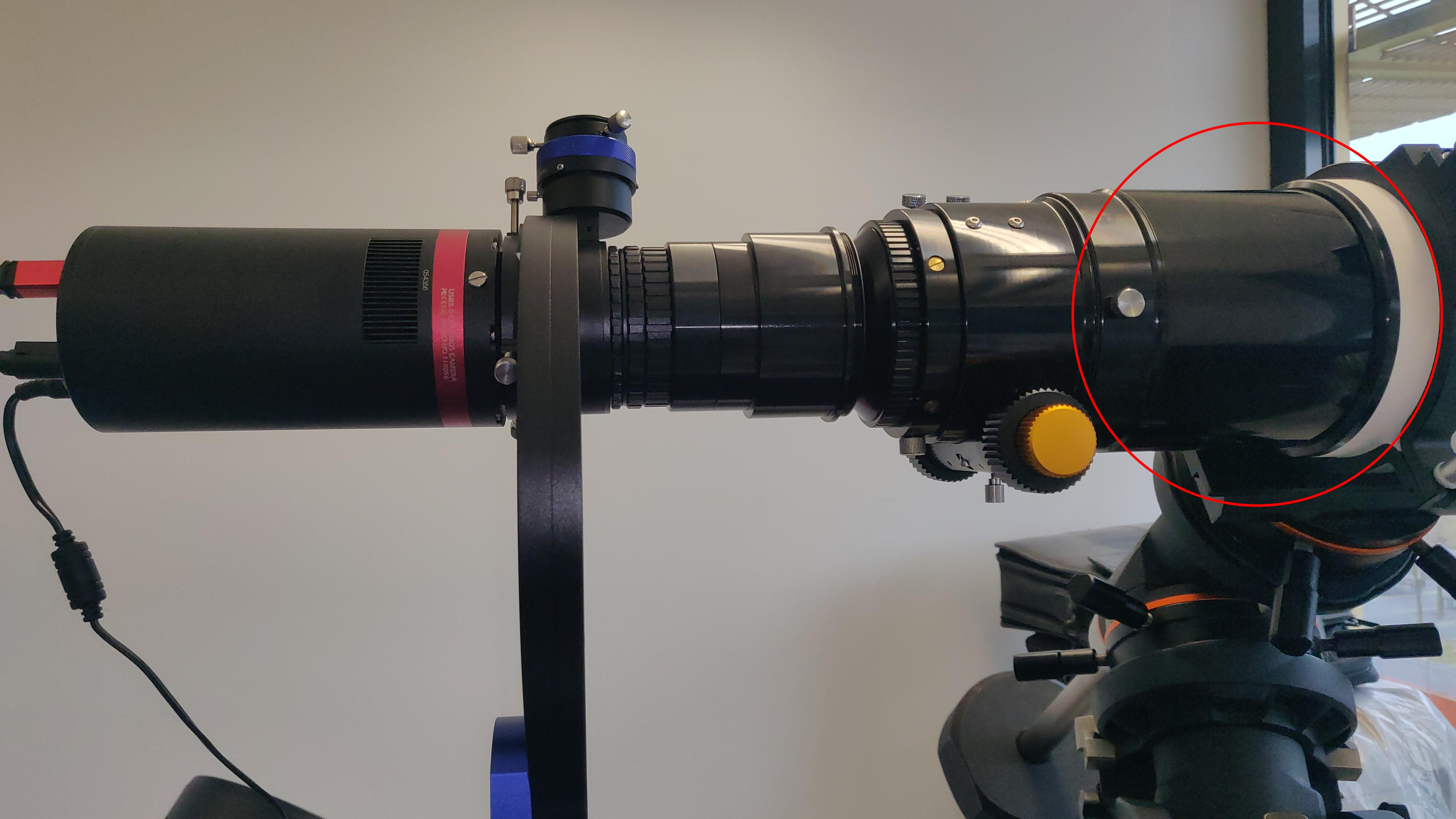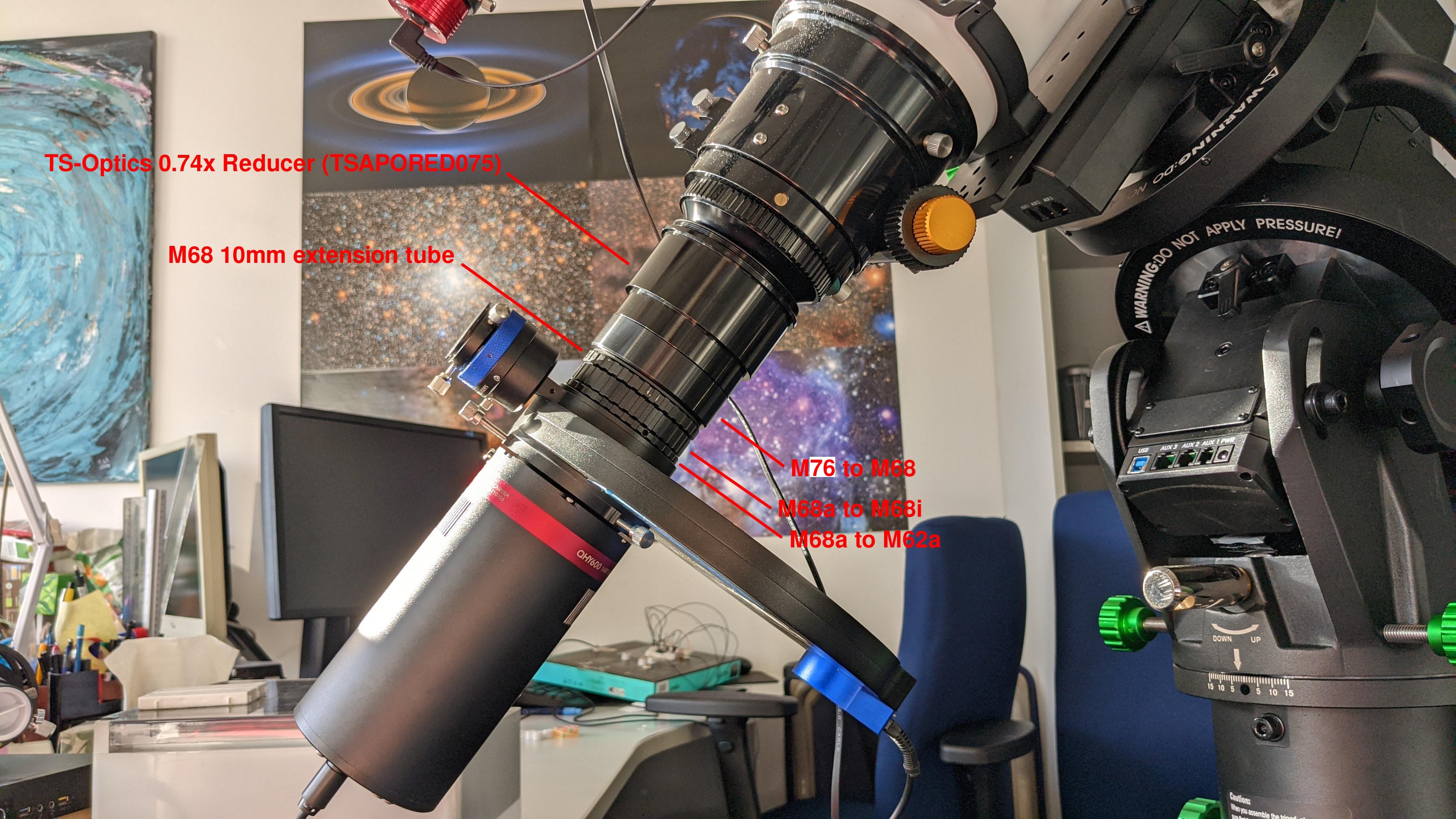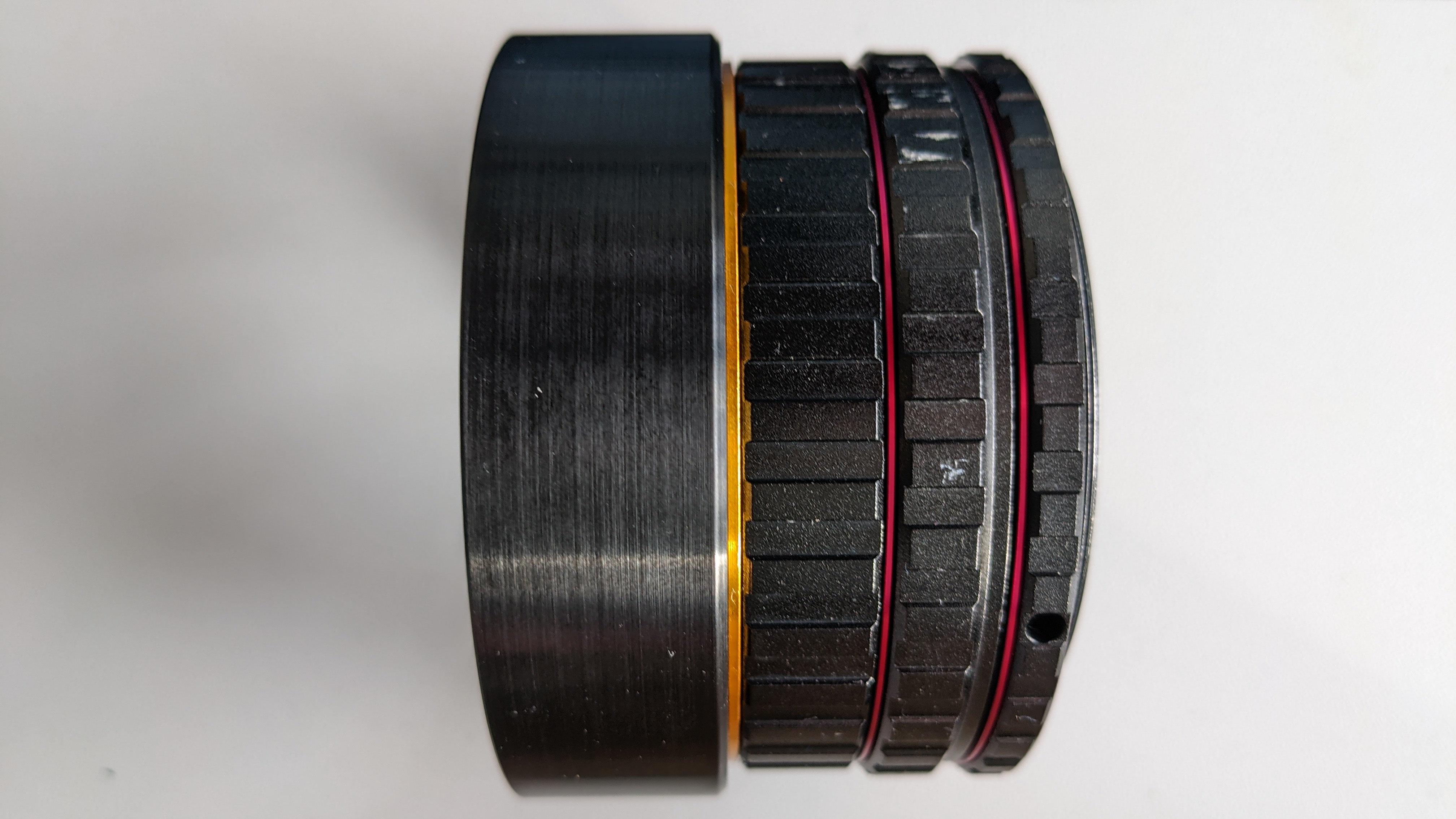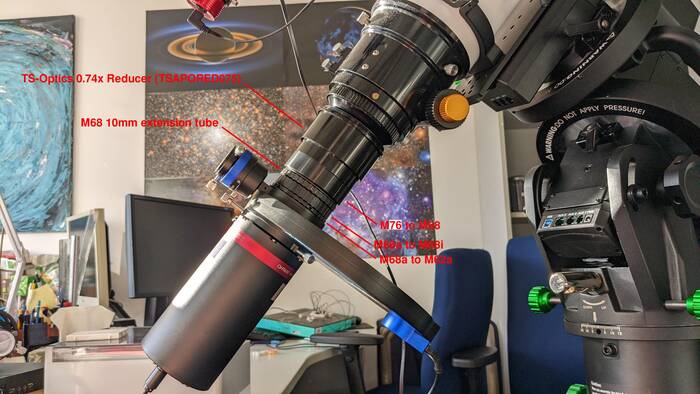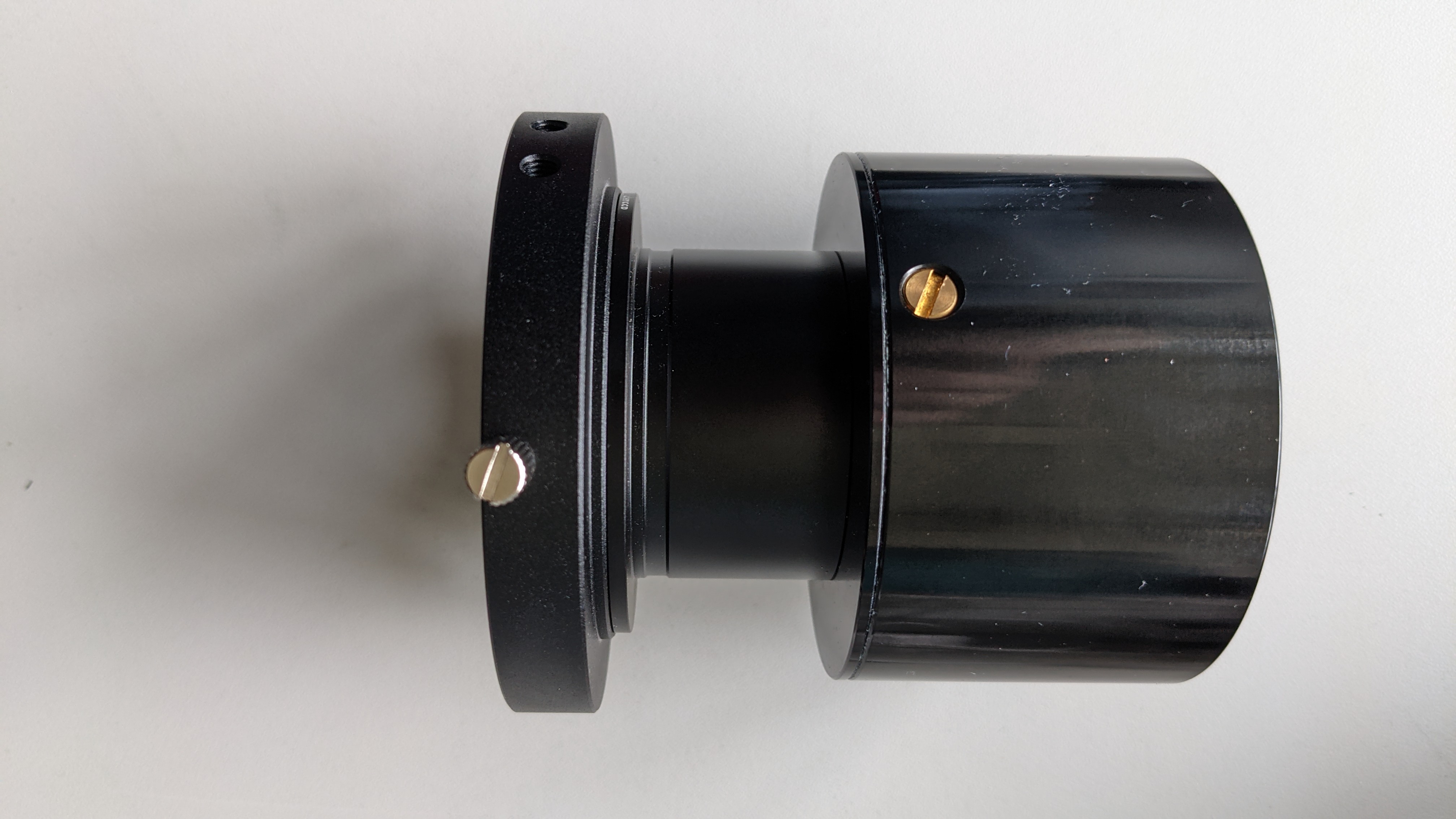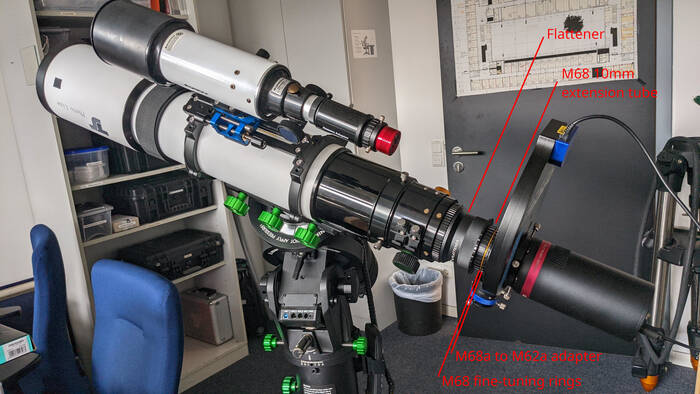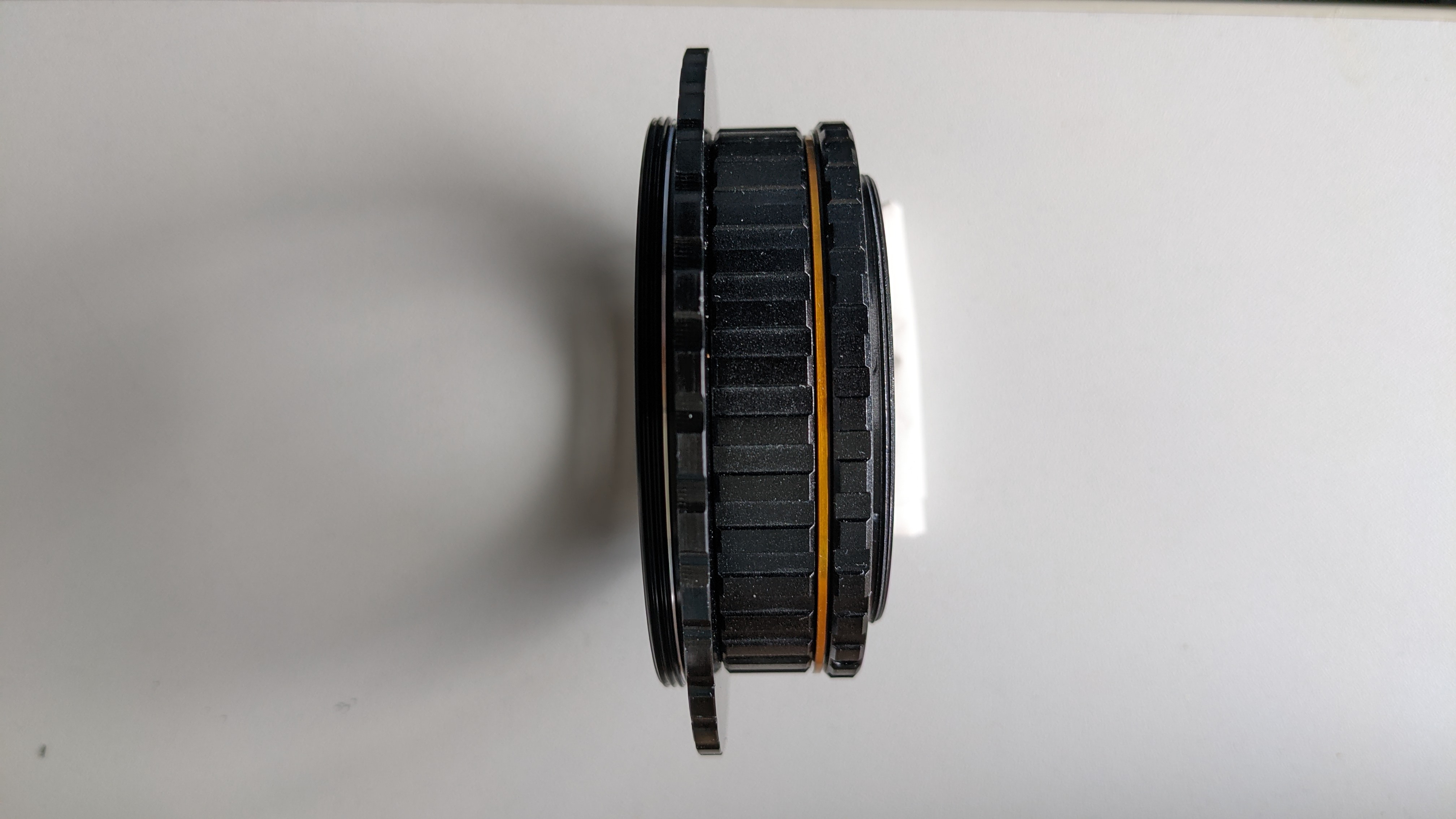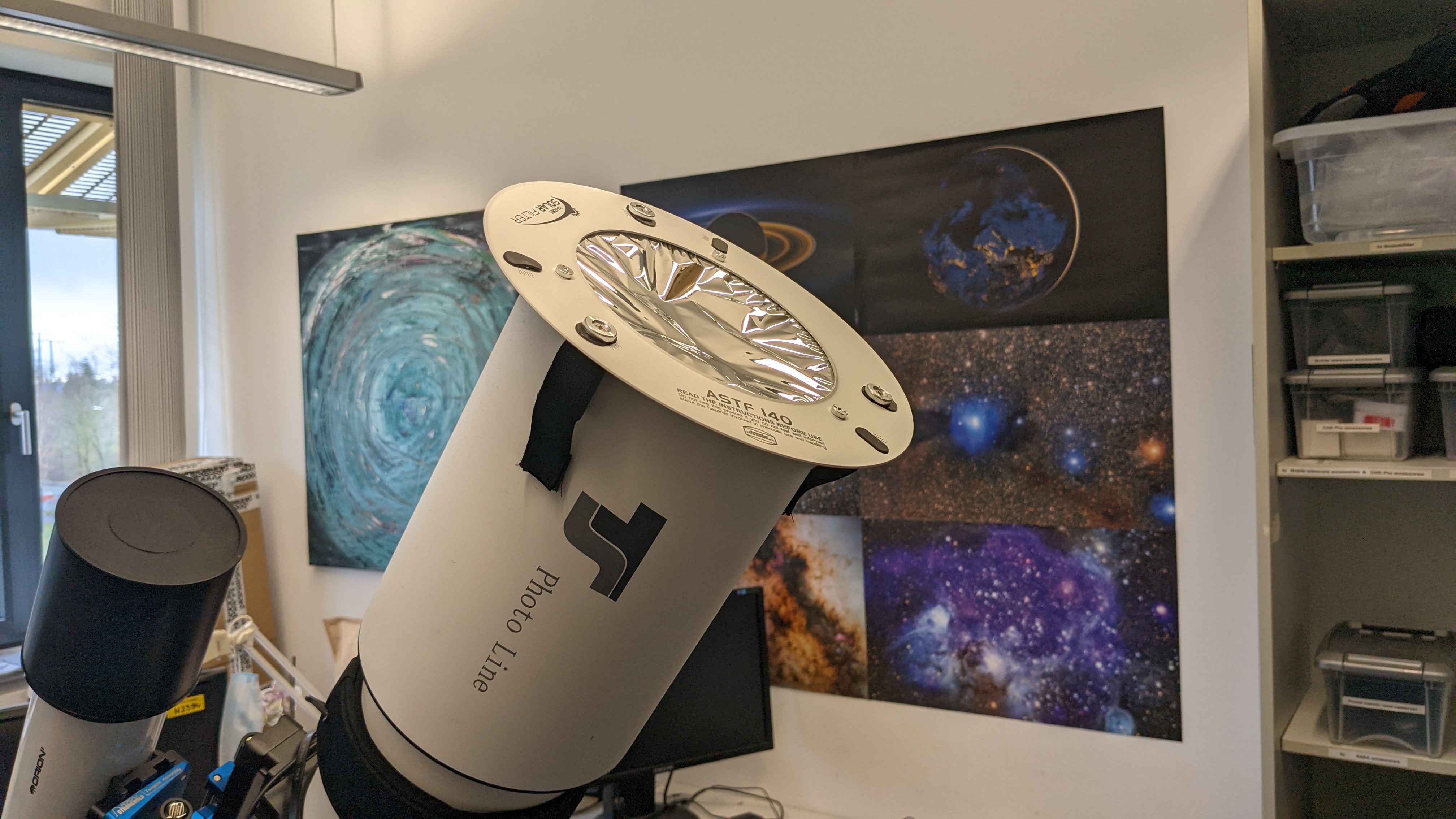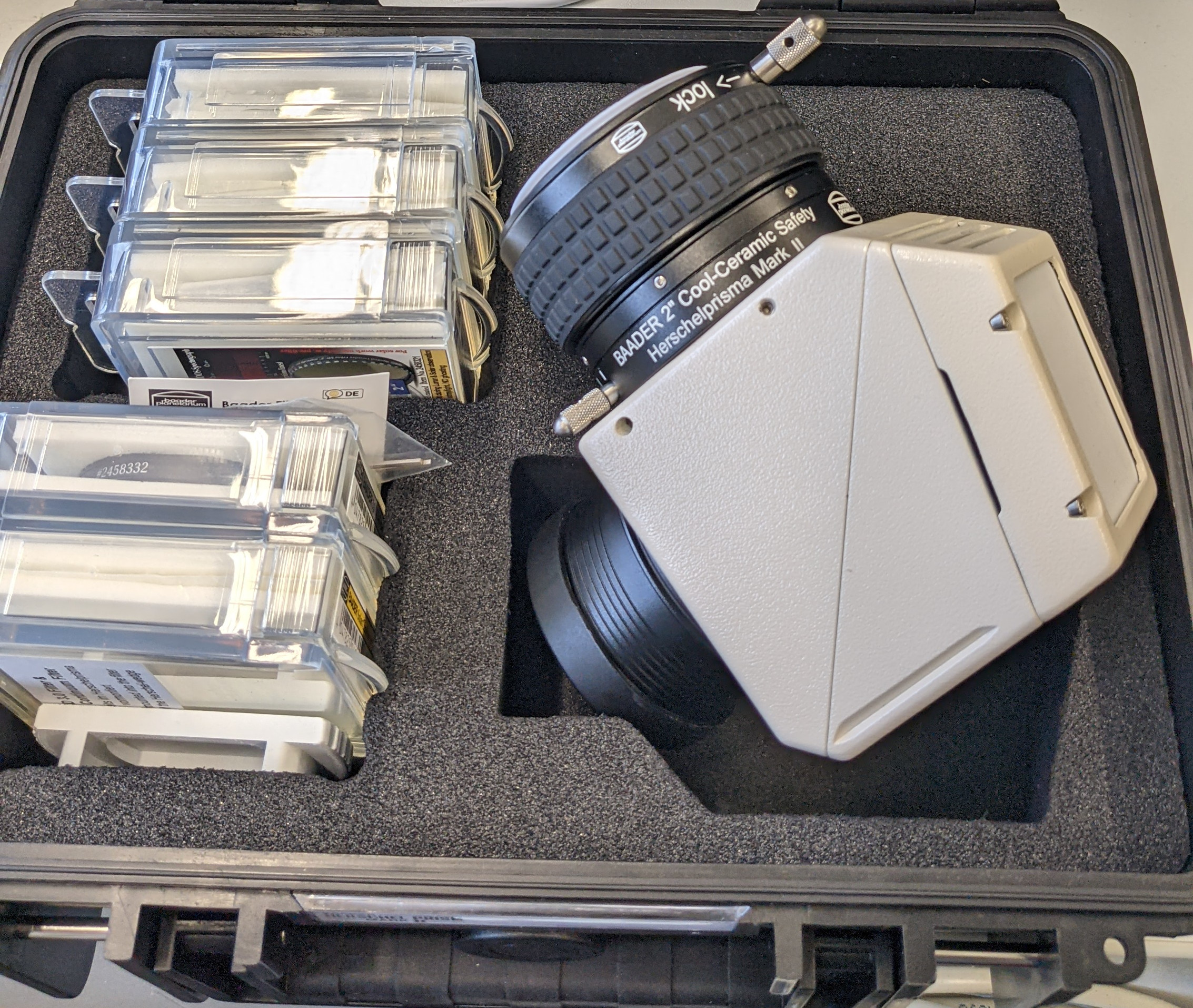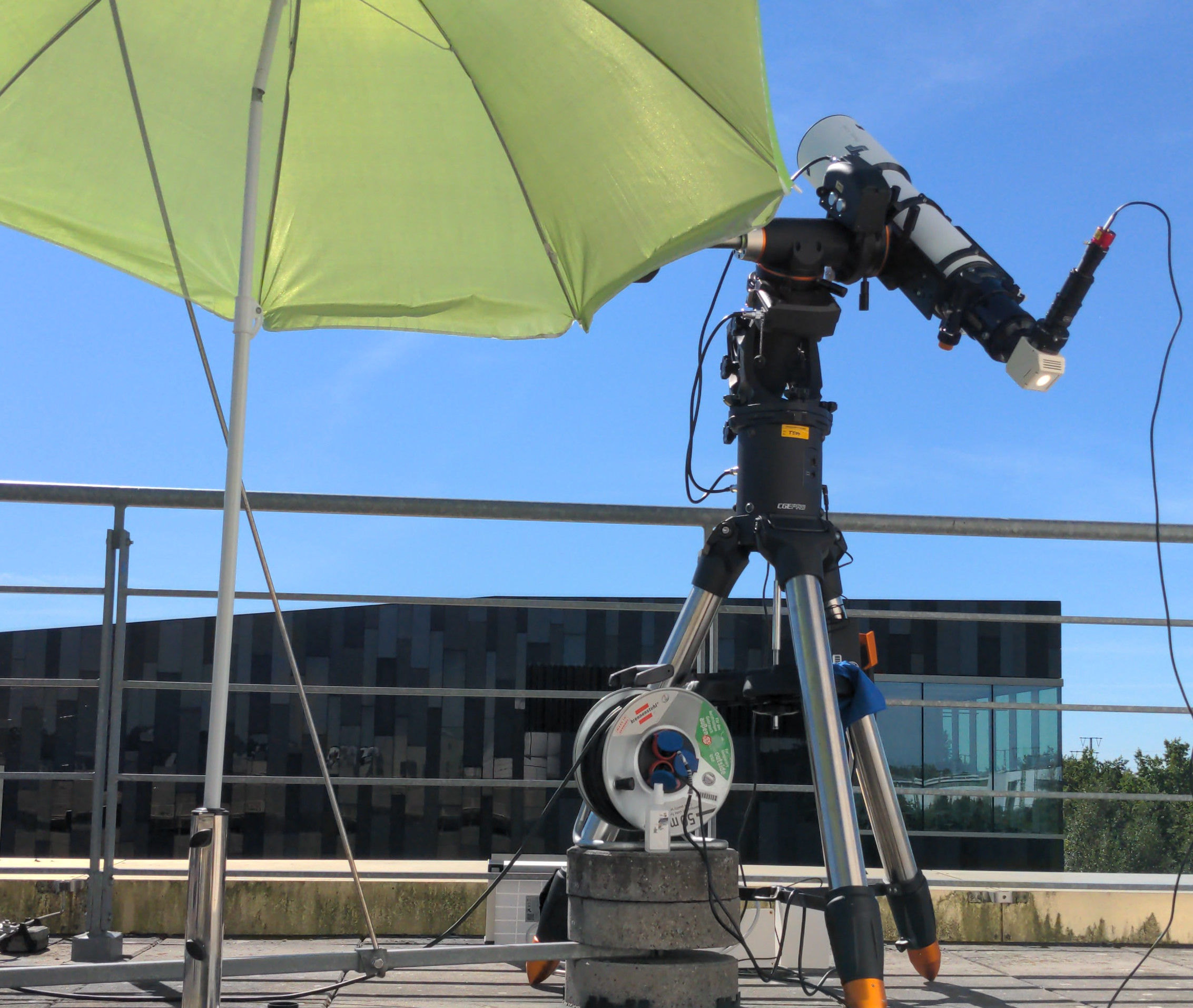Table of Contents
130mm Apochromat from Telescope-Service
This page is still under construction… 
This page is about our TS-Optics-PHOTOLINE Apochromat. It has an aperture of 130mm and a focal length of 910mm. Consequently, the focal ratio is f/7 but can be reduced to f/5.2 with a reducer. It is equipped with a triplet air-spaced objective lens featuring an SFPL-53-ED glass element from Japan and a 3.7“ focuser.
Eyepiece-side connections:
- 1.25″
- 2″
- M68x1 internal thread
- M92x1 internal thread
Available Accessories:
Suitable Mounts:
Articles related to specific mounts are linked, and their setup is often described in combination with one of our other telescopes. However, the basic steps for assembling each mount are universal.
- Celestron CGX-L
- Sky-Watcher EQ8-R Pro
Working Distance:
- 123mm from the 2” eyepiece holder
- can be extended to 223mm
Configuration
0.74x Reducer
Reducer + QHY600M with Filter Wheel and Off-Axis Guider
This setup is the standard for deep-sky observations as it provides the widest field of view. The reducer used is the TS-Optics 0.74x Reducer with:
- camera side M48x0.75 external thread with 55mm working distance
- camera side M76x1 external thread with 105.7mm working distance
- telescope side M88x1 external thread and M82x1 internal thread
The reducer reduces the focal ratio to f/5.2. The “drawback” of this setup is that the extension tube between the tube and the focuser must be removed, otherwise, achieving focus becomes impossible. This process requires care as the threads are delicate. For a comparison, see the following two images:
This setup requires the following adapters to be mounted in the order seen from the telescope:
The camera along with the filter wheel, filter, and off-axis guider has a back focus of 56mm. The working distance behind the M76 thread of the reducer is 105.7mm. Thus, a distance of 49.7mm needs to be bridged. Simultaneously, a translation from M76 to M62 thread is required. The former is achieved with an M76 to M68 adapter from TS Optics, a conversion adapter from M68a to M68i, and an adapter from M68a to M62a. These three adapters have an optical path length of 37.7mm. The remaining 12mm are bridged by a 10mm M68 extension and three M68 fine-tuning rings with a total optical path length of 2mm.
It is important to note that before mounting the above adapter combination, the long M48 adapter, usually present on the reducer, must be unscrewed to expose the M76 thread.
Note: If the off-axis guider is not used, a 20mm M68 extension must be used instead of the 10mm extension.
| Position | Adapter | Optical Path Length [mm] |
|---|---|---|
| 1 | TS Optics M76 → M68 Adapter | 20.7 |
| 2 | M68 Fine-Tuning Ring (golden) | 1 |
| 3 | M68a → M68i Conversion Ring | 12 |
| 4 | M68 Fine-Tuning Ring (red) | 0.5 |
| 5 | M68 10mm Extension | 10 |
| 6 | M68 Fine-Tuning Ring (red) | 0.5 |
| 7 | M68a → M62a Adapter | 5 |
Reducer + QHY600M with UFC Filter Holder
The same principles apply here as above, but the adapter combination is slightly different:
| Position | Adapter | Optical Path Length [mm] |
|---|---|---|
| 1 | TS Optics M76 → M68 Adapter | 20.7 |
| 2 | M68 7.5mm Extension | 7.5 |
| 3 | M68a → M68i Conversion Ring | 12 |
| 4 | UFC S70 / M68x1 | 1 |
| 5 | UFC Varilock | 15-20 |
| 6 | UFC Tilter | 9.75-10.5 |
| 7 | UFC Base | 13 |
| 8 | Camera Adapter M54 → Camera Clamp | 6 |
This adapter combination has an optical path length of 87.2 mm when the Varilock is set to 16.5-17.25 mm. Combined with the QHY600M, which has a back focus of 17.5 mm, and the installed filters, this gives a total working distance of 105.7 mm behind the M76 thread of the reducer.
QHY600M
The QHY600M can also be mounted on the APO without additional filter holders, filter wheels, etc. All you need is the QHY camera adapter with M54 internal thread and a QHY 2“ eyepiece holder with M54 external thread on one side and M84 internal thread on the other side. The M48 thread then fits onto the M84 thread of the reducer.
| Position | Adapter | Optical Path Length [mm] |
|---|---|---|
| 1 | QHY Camera Adapter | 5 |
| 2 | 2” Eyepiece Holder | 33 |
Together with the camera's 17.5 mm back focus, this provides the required working distance of 55±1 mm from the M48 of the reducer.
Flattener
Flattener + QHY600M with Filter Wheel and Off-Axis Guider
The flattener is also from TS-Optics, keeps the focal length unchanged and has the following threads:
- Camera side M48x0.75 external thread with 55mm working distance
- Camera side M54x0.75 internal thread with 62.5mm working distance
- Camera side M78x1 internal thread with 77.5mm working distance
- Telescope side M92x1 external thread
| Position | Adapter | Optical Path Length [mm] |
|---|---|---|
| 1 | TS Optics M78a → M68a Adapter | 3.3 |
| 2 | M68a → M68i Conversion Ring | 12 |
| 3 | M68 Fine-Tuning Ring (golden) | 1 |
| 4 | M68 Fine-Tuning Ring (black), optional | 0.3 |
| 5 | M68a → M62a Adapter | 5 |
As mentioned earlier, the working distance from the M78 thread is 77.5mm, with the camera including filter wheel, filter, and off-axis guide having a back focus of 56mm. The remaining 21.5mm is bridged by the above adapter combination.
Note: If the off-axis guide is not used, an additional 10mm M68 extension must be inserted between the fine adjustment rings.
Flattener + QHY600M with UFC Filter Holder
| Position | Adapter | Optical Path Length [mm] |
|---|---|---|
| 1 | TS Optics M78a → M68a Adapter | 3.3 |
| 2 | M68 Fine-Tuning Ring (golden) | 1 |
| 3 | M68 10mm Extension | 10 |
| 4 | M68 Fine-Tuning Ring (golden) | 1 |
| 5 | M68 Fine-Tuning Ring (red), optional | 0.5 |
| 6 | M68a → M68i Conversion Ring | 12 |
| 7 | M68 Fine-Tuning Ring (golden) | 1 |
| 8 | M68 Fine-Tuning Ring (black), optional | 0.3 |
| 9 | UFC S70 / M68x1 | 1 |
| 10 | UFC Tilter | 9.75-10.5 |
| 11 | UFC Base | 13 |
| 12 | Camera Adapter M54 → Camera Clamp | 6 |
Together, this results in an optical path length of approximately 58.8 mm, depending on the tilter position and fine-tuning rings installed. Combined with the 17.5 mm back focus of the QHY600M and the installed filter, this results in 77.5 mm from the M78 thread.
Solar Observations
Solar Filter
For visual observations, a Baader Planetarium tension-free solar filter can be used. This filter is simply mounted in front of the objective. Any eyepiece and camera can be used. However, the Herschel prism described below usually provides better image quality.
Herschel Prism
We also have a Herschel Prism Mark II from Baader Planetarium, which allows us to observe the Sun in white light with excellent quality. The Herschel prism can be equipped with different filters, so that it can be configured for visual observations as well as for camera observations with very short exposure times. Details about the Herschel prism and its operation can be found in the associated article.
The Herschel prism can be used in many different configurations, for example with or without a Barlow lens. However, the standard procedure is to insert it directly into the 2“ eyepiece clamp of the APO.
Different camera models can also be used here. The prism has a 2” eyepiece clamp for mounting accessories.
